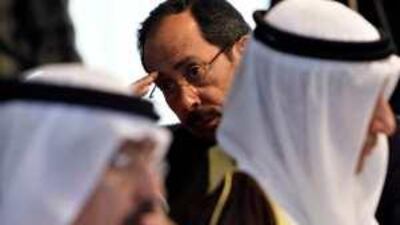SANA'A // Yemen's lack of a professional administration will continue to cripple the country, no matter how much aid is pledged and how streamlined disbursement is made, analysts said yesterday. In 2006, the international community promised US$5.5 billion (Dh20.2bn) in aid to Yemen for 2007-2010, with $3.7bn of that coming from Gulf states. A two-day meeting in Riyadh that ended yesterday was meant to work out how to speed up the delivery of these pledges in the effort to stabilise the violence-torn country.
But Mustafa Nasr, director of the Studies and Economic Media Centre, a non-governmental organisation, said: "Even if the donors implement their own projects, Yemen will still need a professional and competent administration that is able to indentify the priorities and draft good plans and feasibility studies on projects to be presented for donors." Yemen has spent only about 10 per cent of the $5.5bn. This fact has led some critics to claim that Yemen is unable to absorb and disburse foreign funds because of managerial, bureaucratic and institutional inefficiencies and corruption within the administration.
Speeding up the process of delivering funds to Yemen was the subject of the Riyadh meeting, said Mutahar al Abbasi, the deputy minister of planning and international cooperation. "Some have said that Yemen should be dealt with as an exceptional case concerning the delivery of the funds, but still there are procedures that have to be followed," Mr Abbasi said. Mr Abbasi said some options were discussed on how to handle this issue of disbursement.
"It is difficult to apply one mechanism on all donors. We have, therefore, discussed some options. The first one is that donors come and implement their projects themselves. The other is that some donors can have international agencies implement their projects." Abdulbaki Shamsan, a professor of political sociology at Sana'a University, said the donors' money will not be effective without political stability.
"The government tried to throw its load on the donors. But, I think the key to sorting out Yemen's multiple crises and challenges is in the hands of the regime," Mr Shamsan said. Mr Shamsan said the role of the donors is financial aid, but the government should prepare the ground for receipt of the money by addressing its political disputes and achieving stability. "Without handling the problem in the south, which is now the major challenge of the country, taking genuine action to deal with the demands of the Houthis and addressing rampant corruption and radicalisation and conducting a dialogue with the opposition, Yemen will not see any kind of stability, which is an important incentive for donors' money. It is not practical that the regime throws its own problems to the donors to fix, without fixing its own problems first," Mr Shamsan said.
The two-day meeting was a follow-up to last month's London gathering of western and Arab states, which was a reaction to the growing presence of al Qa'eda in the country. Concerned that the terrorist network would find a safe haven amid Yemen's internal disarray, the London conference pledged to assist Yemen with its multiple domestic problems. In addition to al Qa'eda, Yemen is facing an intermittent insurgency in the north. The government announced a truce with the Shiite al Houthi rebels last month. That conflict appears to be drawing to a close.
But Yemen also faces a growing secessionist movement in the south as well as multiple economic challenges including depleting water and oil resources, poverty and unemployment. Separatists protested in the thousands in the southern towns of Lajh, Dhale and Abyan while the conference was being held in Riyadh. Yesterday, Ali Saleh al Yafee, a southern separatist leader with alleged ties to al Qa'eda, his wife, two children and two policemen were killed in a firefight in Abyan province.
The defence ministry said one policeman was wounded and three other separatists were arrested in the attack. But, local sources said that at least five of al Yafee's supporters were also wounded. The fighting erupted when security forces tried to arrest al Yafee, who is also accused of supplying the separatists with arms. Southern Yemen joined a unified Yemen in 1990, but started a political movement demanding secession from the north, blaming the northerners for marginalising them after a 1994 civil war in which the north defeated the south and extinguished the secession bid.
malqadhi@thenational.ae

